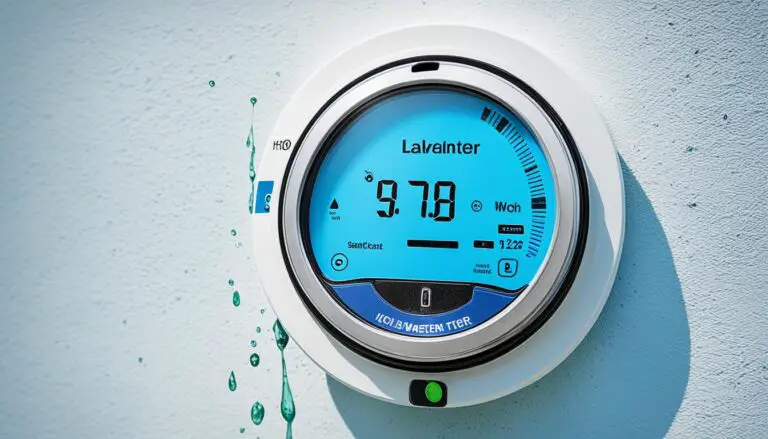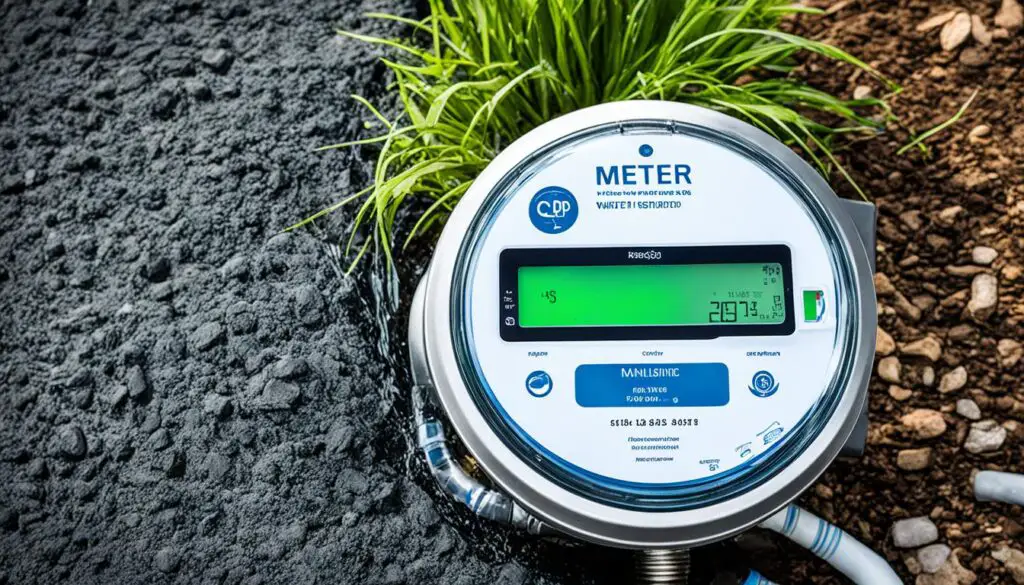Smart water meters are changing how we track and control water use. They use wireless tech to monitor water usage and spot leaks, cutting down on waste. With Advanced Metering Infrastructure (AMI), they can follow water use in real-time. They help find flow and pressure issues, and even notice when places are empty or tampered with.
One big plus of smart water meters is they cut down on water lost to leaks. They support flexible water billing, avoiding the need for people to read meters. This lets bills be made automatically from the data collected. They help users see where they’re using too much water and encourage saving. Plus, the data helps operational teams get better at managing water delivery. Smart water meters measure water use accurately, which is super useful for smart cities, homes, and green businesses.
Key Takeaways:
- Smart water meters use wireless communication to monitor water usage and detect leaks.
- Advanced Metering Infrastructure (AMI) systems work alongside smart water meters to track consumption and identify anomalies.
- Smart water meters support dynamic billing and help users identify inefficiencies in their water usage.
- The data collected from smart water meters aids operational teams in optimizing delivery patterns.
- Smart water meters contribute to efficient and sustainable water resource management.
Types of Smart Water Meters
Smart water meters come in many types to fit different needs. Each type has special features for utility companies and their customers. Let’s take a look at the various smart water meters available:
1. Ultrasonic Meters
Ultrasonic meters measure water flow with sound waves. They are very precise, making them great for industrial use. They can detect small changes in flow, important for industrial processes and water management.
2. Electromagnetic Meters
Electromagnetic meters use magnetic fields to find out how much water is moving through. They are accurate and work well in big pipes and in commercial or industrial areas. These meters can manage high flow rates and cope well with different outside conditions.
3. Vortex Flow Meters
Vortex flow meters work by noticing vortices caused by water hitting an object. They can be used with clean or dirty water, making them good for many industries. Wastewater treatment is a common place you’d find these meters.
4. Hybrid Meters
Hybrid meters mix different technologies like ultrasonic and electromagnetic. This makes them accurate and flexible for various flow rates and situations. They can be adjusted for specific needs, fitting many types of applications.
Different smart water meters are designed for different tasks. Utility companies and customers can pick the best one for accurate water use tracking, efficient management, and saving water.
Communication Technologies in Advanced Metering Infrastructures (AMI)
Advanced Metering Infrastructures (AMI) use many communication methods. These methods help collect and send data from smart water meters to main systems. They are vital for the smart metering systems to work well and accurately.
RF mesh networks are a key communication technology in AMI. In these networks, smart meters link up, forming a connected network. This setup improves communication and reduces signal loss. RF mesh networks are great for big projects and tricky landscapes.
RF fixed networks create a straight path for communication between smart meters and certain points. This method is popular in cities and suburbs. RF fixed networks are reliable, secure, and allow for real-time monitoring.
AMI systems also use cellular networks. They use 4G and the new 5G networks for data transmission. This makes it easy to connect in all areas, even remote ones. It’s great for places without many communication options.
For larger areas, AMI might use LoRaWAN and LPWAN technologies. These wireless techs work over long distances and are low in power use. They’re good for big or rural areas.
AMI systems can also have hybrid networks. These systems mix different technologies. This makes them flexible and efficient, reaching many areas well. Hybrid networks use the benefits of various technologies for smooth data flow.
Advantages of Different AMI Communication Technologies
| Communication Technology | Advantages |
|---|---|
| RF mesh networks | Reliable and extensive coverage, well-suited for large-scale deployments |
| RF fixed networks | Direct communication path, suitable for urban and suburban areas |
| Cellular networks | Wide network coverage, ideal for both urban and rural locations |
| LoRaWAN and LPWAN | Low-power, long-range options for wide area coverage |
| Hybrid networks | Combines multiple technologies for maximum efficiency and coverage |
AMI systems use different communication technologies effectively. This ensures the steady and efficient sending of data. Whether by RF mesh or fixed networks, cellular, LoRaWAN, LPWAN, or hybrid networks, these technologies lay the groundwork for smart metering.
Conclusion
Smart water meters provide great benefits for both utilities and customers. They give accurate readings. This results in real-time billing and less water loss. They also help find leaks and save water.
These meters can quickly find leaks and unusual water use. This means repairs can happen fast, saving a lot of water. It helps us focus on saving water for the future.
Smart meters also give data that helps with managing water better. Utilities can see how water is used and plan improvements. This means more efficient water use. Customers get to monitor their water use in real-time. This helps them make better choices.
Putting money into smart meters is a key step in updating water systems. It helps manage water better, find leaks, and encourage saving water. Smart meters are leading the way to a sustainable future for everyone.



